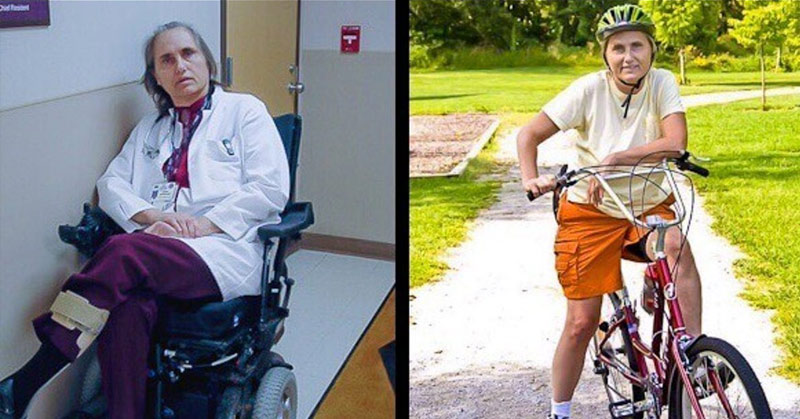Dr Terry Wahls is a medical academic at the University of Iowa. In 2004, when Terry was 45 years old, she was diagnosed with Multiple Sclerosis (MS). She struggled with weakness in her left leg, which left her stumbling. Her health history also included abnormal spinal fluid, spinal cord lesions, and diminishing vision.
Terry’s health declined fairly quickly, and within 3 years of her diagnosis, Terry was in a wheelchair.
At the time, Terry was adamant on treating her MS through standard allopathic treatment, and pharmaceuticals, willing to try the latest MS drug therapies available. She reached a point where she was almost entirely bedridden, she couldn’t sit for more than 10-minutes as she was so weak, and her fatigue was very intense.
This led Terry to begin researching more alternative approaches, one of which was the relationship between adequate nutrition and MS. From there she began experimenting with natural MS management methods. She recognized the roles that nutrition, exercise and the environment play in the progression of MS and Terry was also knowledgeable on the human microbiome, and how the types and amounts of microbes growing in our gut affect our health and regulate immunity.
An initial area of focus was cognitive health, in order for Terry to take action on her health, she needed to sort out the brain fog first. She had researched ‘what vitamins, minerals, fats, proteins and antioxidants my brain needs to properly function?’
With this search, Terry discovered that consuming refined sugars, grains, processed, and packaged foods were correlated with poor gut bacteria, which are associated with decreased health and well-being. [1]
She determined her diet focus would be to focus on whole, fresh foods. Terry was set the eliminate all processed foods and replace them with up to 9 servings of nutrient-dense vegetables each day, which are known to support a healthy microbiome. [2]
Inspired by this information, Terry developed MS protocol. She created a diet for her brain, which would provide her brain with what it needed, and she also implemented some stress-management activities.
Her goal was to create a healthy environment for the brain and tune-in on the environmental factors and how they play a role in achieving optimal health and wellness.
With these changes, Terry radically improved her quality of life, she went from being bed-ridden to biking. No longer limited by weakness and pain.
MS Diet Details
Terry’s plan included 9 servings of nutrient-dense vegetables per day, animal-based omega-3 fatty acids and seaweed.
Vegetables included:
- Dark leafy greens such as chard, collards, kale, spinach, beetroot leaves, and watercress.
- Sulphur-rich, cruciferous vegetables such as broccoli, cauliflower, brussels sprouts, cabbage, and radishes.
- Deep colored fruits and vegetables such as carrots, beets, and berries.
Animal and plant-based proteins included:
- Modest amounts of grass-fed meats
- Omega-3 rich fish such as wild salmon, rainbow trout and sardines
Terry also eliminated refined sugars, processed foods, grains, and pasta
Since our microbes play an essential part in our well-being, they create healthy energy levels, allow us to efficiently digest and absorb nutrients, produce fatty acids and synthesize vitamins.
This diet led to an improved quality of life for Terry, and others with MS. While Terry cannot state that this diet can ‘cure the disease’, if you are struggling with MS, forming healthy eating habits while working alongside a medical practitioner is just one way that you can work to control and improve your quality of life and the symptoms of disease.
If unhealthy lifestyle choices are triggering your symptoms to worsen or progress, this lifestyle program may work to reduce symptoms. Terry has also reported that patients who follow the lifestyle have been prescribed lower doses of their prescription medications.
Terry encourages people with autoimmune conditions such as MS to begin to implement what makes sense. We know that vegetables are good for us, so find a way to eat more vegetables. We should know how important omega-3 is for cognitive function and inflammation, so include more wild-caught fatty fish, hemp seeds and seaweed. Nutrition just makes sense. Once you see small improvements to your health, you will be more inspired and further inclined to educate on the subject, so that you can benefit more.
Always consult a medical professional before starting a diet or making any major lifestyle change. If you have symptoms that are worrying you, seek advice from your doctor.
Sources
- Impacts of Gut Bacteria on Human Health and Diseases https://www.ncbi.nlm.nih.gov/pmc/articles/PMC4425030/
- Influence of diet on the gut microbiome and implications for human health https://www.ncbi.nlm.nih.gov/pmc/articles/PMC5385025/
- From bed-ridden to biking: Meet the woman who tackled MS with diet https://www.sbs.com.au/food/article/2018/05/02/bed-ridden-biking-meet-woman-who-tackled-ms-diet

